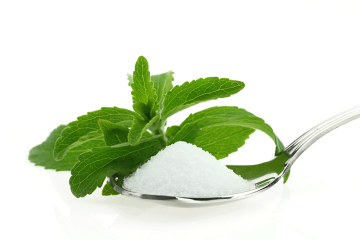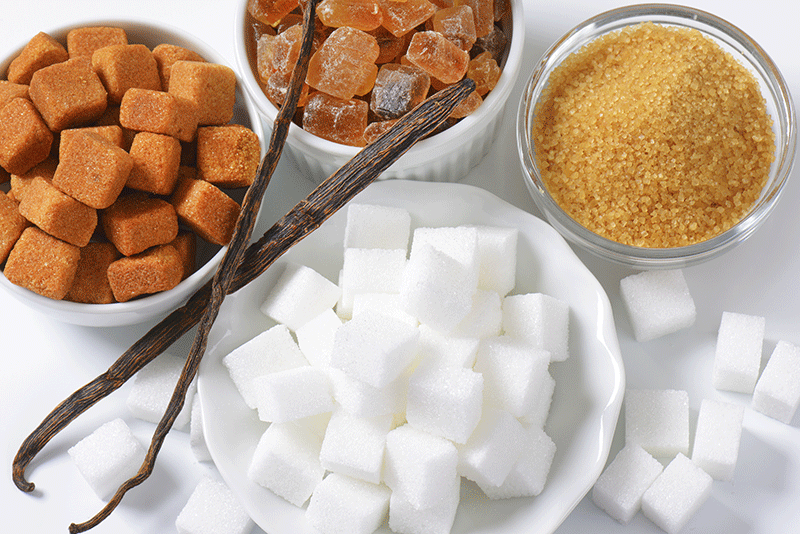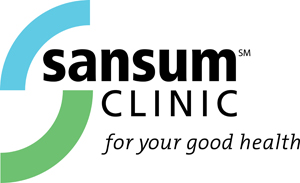The average American consumes more than 22 teaspoons of added sugars per day. Over consumption of sweets is linked to weight gain, the development of insulin resistance, fatty liver, type 2 diabetes and cardiovascular disease. Scientists have developed non-caloric artificial sweeteners but the safety and impact of these chemicals is not clear. Natural alternatives to the refined white granules we typically think of as sugar are available, but natural doesn’t always necessarily mean healthful.
People have more than a few options for sweeteners beyond refined sugar
Nutritional information specialized for athletes
is provided by registered dieticians
at Sansum Clinic of Santa Barbara.
Some of the more popular natural, alternative sweeteners available today are honey, maple syrup, agave syrup, stevia, monk fruit, coconut palm sugar and date sugar. With all of these options and more to choose from, deciding what sweetener to use can be a challenge for health-conscious consumers.
Whether something is a good choice or not often depends on the outcome being assessed. The key, as with so many things, is moderation. There’s strong evidence that definitely suggests that Americans need to decrease their sugar consumption. The American Heart Association recommends that women get no more than 100 calories per day from added sugars, and men no more than 150 calories per day.
That doesn’t mean sweet-tasting foods are off the menu altogether. One way to limit sugars is to try a non-caloric natural alternative such as stevia. The stevia plant, also known as sweet leaf or honey leaf, is a shrub originally grown in South America. The extract made from this plant’s leaves is about 200 times sweeter than table sugar. This intense sweetness comes from glycosides, sugars bound to non-sugar substances. Glycosides can’t be metabolized in the human body, so stevia doesn’t provide any calories.

Stevia is a natural product that doesn’t have calories
Most suggest that stevia has no adverse effects on human health. In light of this, the FDA granted generally recognized as safe (GRAS) status to refined stevia preparations such as Reb A, a purified stevia glycoside, but whole-leaf stevia and crude extracts are not yet FDA-approved. Preliminary studies have looked at the potential for using stevia glycosides as dietary supplements to aid in controlling blood sugar and blood pressure and fighting cancer, but more data is needed.
Purified stevia leaf extract is being used in some sodas, sports drinks, bakery items and other mainstream products. It’s also available for home use in tabletop packets, liquid drops, dissolvable tablets, spoonable products and baking blends. Stevia has a bitter aftertaste, so it’s almost always found blended with a caloric sweetener such as dextrose.
—By Kristin Price, RD, Cancer Center of Santa Barbara
The follow muffin recipe is surprisingly sweet and makes a good breakfast treat.
RECIPE:
Stevia Blueberry Muffins
Yield: 10-12 muffins• 6 oz. pineapple juice
• 1/4 cup oil
• 1 egg
• 1 1/2 tablespoons SteviaPlus®
• 1 teaspoon vanilla extract
• 1/2 cup plain yogurt
• 2 oz. milk
• 1 cup blueberries (fresh or frozen)
• 1/2 cup rolled oats
• 1 3/4 cup whole-wheat pastry flour
• 1 teaspoon baking soda
• 1/4 teaspoon salt
Preheat the oven to 375°F. Oil muffin pans. Soak the oats in the pineapple juice for 10-15 minutes in a small bowl. Beat together the oil, egg and vanilla in a mixing bowl. Thin the yogurt with the milk and add to the other liquid ingredients. Beat well. Mix in the soaked oats. Sift together the flour, baking soda and salt. Fold the dry ingredients into the wet, stirring as little as possible. Fold in the blueberries just before the flour is completely blended. Spoon the batter into the muffin pans and bake for 25-30 minutes.Nutrition Facts Per Serving (1 muffin):
Calories 110;
Total Fat 2.7gm; Saturated Fat 0.6gm; Trans Fat 0.0g; Cholesterol 19mg
Total Carbohydrates 18.0g; Dietary Fiber 2.5g; Sugars 2.7g
Protein 3.4g


